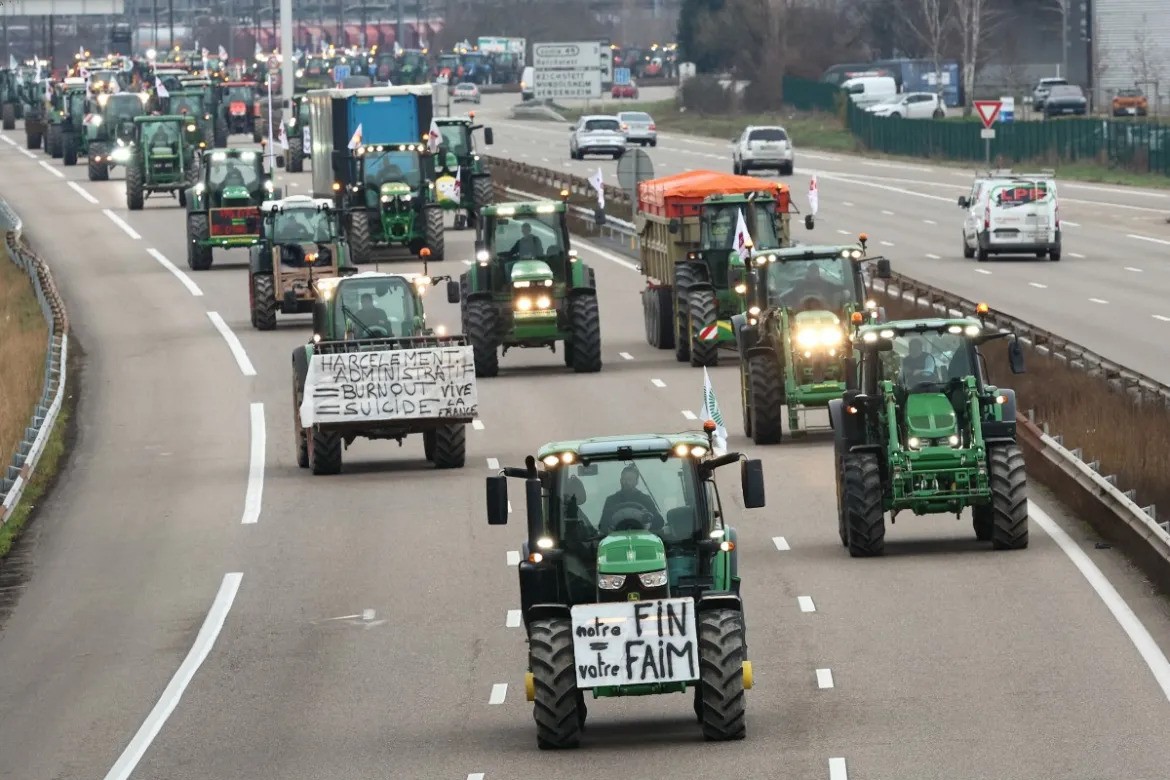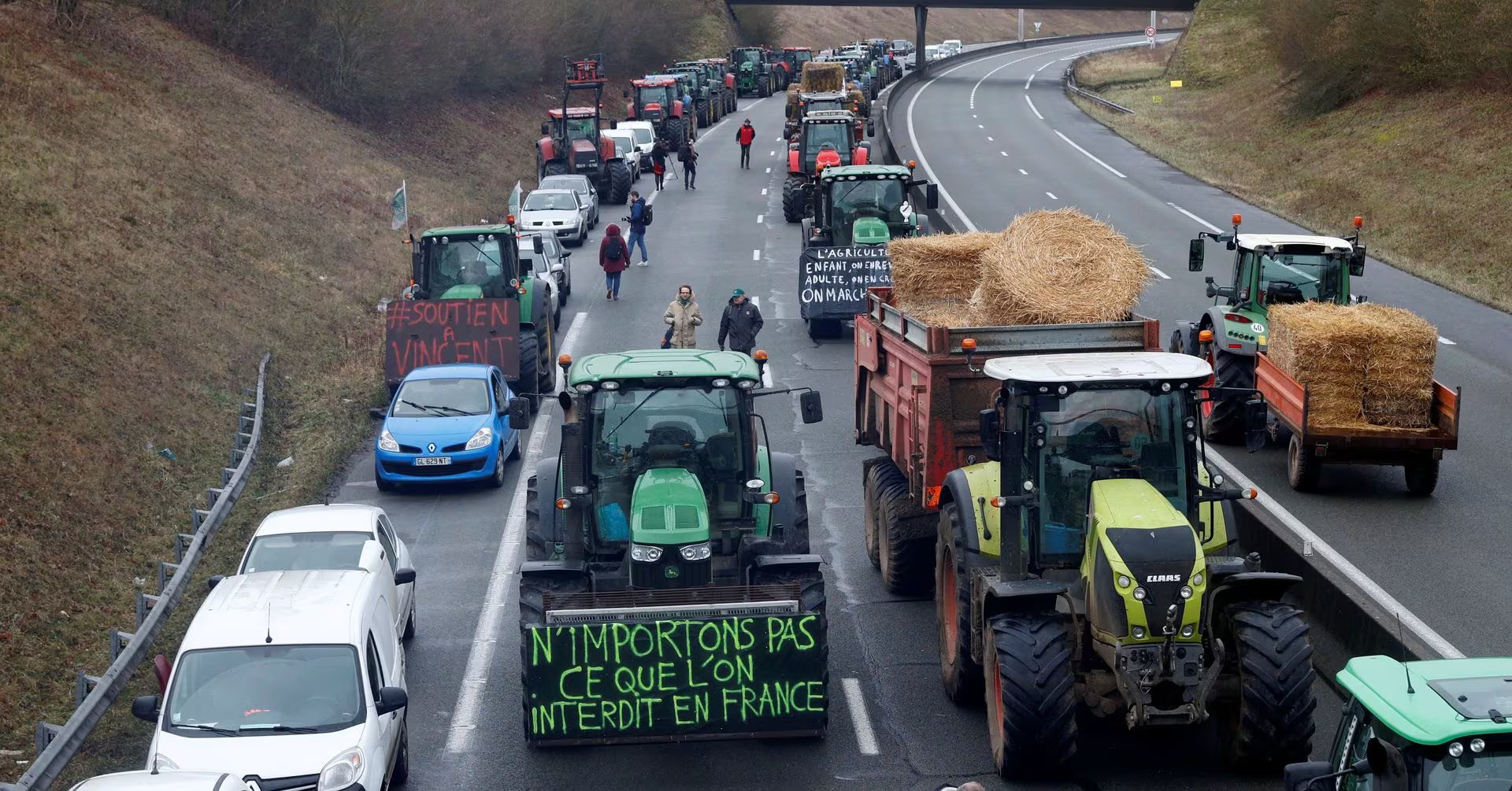French Farmers Approach Paris, Putting The Government In A Bind
French farmers approach Paris, putting the government in a bind. French farmers have seized the nation's attention by inundating government offices with manure and blocking Paris with tractors and hay bales, causing traffic chaos.
Author:Dexter CookeReviewer:Hajra ShannonFeb 01, 20241.5K Shares83.9K Views

French farmers approach Paris, putting the government in a bind. French farmers have seized the nation's attention by inundating government offices with manure and blocking Paris with tractors and hay bales, causing traffic chaos. Their protests, they argue, are long overdue. Grievances have been simmering in France, the European Union's agricultural powerhouse.
The economic repercussions of the Russian invasion of Ukraine, such as increased costs, have exacerbated farmers' frustrations in France and across Europe. Additionally, the challenges posed by climate change and demands for more sustainable and efficient agricultural practices are further squeezing the approximately 500,000 French farmers, who already face stiff competition from their international counterparts.
Reasons For The Protest
Protesters argue that it has become increasingly challenging to earn a sustainable income from their agricultural activities, whether it's tending to fields, greenhouses, or livestock. For some, it has become outright impossible.
The escalation of energy costs following Russia's full-scale war in Ukraine in February 2022 has dealt a severe blow to farmers who rely on fuel-intensive machinery like tractors and harvesters. Also, prices for essential inputs for intensive farming, such as fertilizers, have soared. Even before these recent challenges, French farmers were grappling with competitiveness issues in the ever-expanding global market.
For instance, according to a 2022 Senate studyaddressing the declining competitive edge of French farms, imports of chicken and cherry tomatoes from countries like Morocco have surged dramatically since 1995. For example, cherry tomato imports skyrocketed from 300 tons to 70,000 tons per year, underscoring the mounting pressure on French agricultural producers.
"Everything we warned of 30 years ago is coming true," said Damien Brunelle, a farmer of cereals and other crops in the Aisne region northeast of Paris. "Our countryside is emptying."
“„Everything we buy has gone up. But we're not getting the same revenue.- Damien Brunelle
Brunelle, a wheat farmer, explains that when the war in Ukraine caused prices to surge, he was able to sell his wheat for 400 euros (equivalent to US$430 at current rates) per ton. However, he now receives less than half of that amount, earning only 190 euros per ton.
Another widespread complaint among protesters is the suffocating burden of bureaucratic regulations imposed by both French and EU authorities, which govern various aspects of farming, land usage, and the allocation of substantial agricultural subsidies. Farmers argue that they are at a disadvantage compared to competitors from countries with fewer regulations and lower operating costs.
Some protesters on the barricades are particularly vocal about Ukraine. With the country fast-tracked for EU membership talks, it's perceived as a formidable competitor. Ukraine's extensive fields of grain and other agricultural products have inundated European markets since the invasion, raising concerns among French farmers about increased competition.
"We're worried because they don’t have the same regulations as us," said Stéphanie Flament, a farmer of cereals and beets east of Paris. "It will be cheaper for the consumer, so where will consumers or companies turn to process flour and so on? To products that cost less."
The Size Of The Protests
In terms of sheer numbers, the current movement has drawn fewer protesters compared to the yellow vest demonstrations that rocked France in 2018-2019, which significantly impacted President Emmanuel Macron's popularity.
Furthermore, these protests are not as disruptive or widespread as the violent unrest witnessed last year following the tragic police shooting of Nahel Merzouk, a teenager of North African descent.
Through their use of cumbersome agricultural machinery to impede and obstruct traffic, as well as depositing malodorous heaps of agricultural waste outside government premises, protesters have rendered themselves impossible to overlook and difficult for law enforcement to contain.
The movement commenced with relatively subdued actions, such as flipping road signs upside-down to denounce what they perceived as irrational agricultural policies. However, when these tactics failed to garner significant attention, they escalated their efforts by mobilizing their tractors.
This week, the farmers intensified their protest by encircling Paris with barricades erected on major highways leading to the capital, thereby increasing the pressure on Prime Minister Gabriel Attal.
“„We are obliged to make a show of strength and have clashes to be heard.- Damien Brunelle
Next Steps
Under instructions to proceed cautiously, law enforcement has largely turned a blind eye as protesters express their frustration through sporadic acts of vandalism. In some instances, officers have even provided motorcycle escorts to assist tractor convoys.
This lenient approach suggests that the government is banking on the movement losing momentum over time, especially with additional concessions expected following the pro-agriculture measures announced last week. However, protesters swiftly dismissed these measures as insufficient.
The situation carries significant implications, particularly with Paris set to host the Olympic Games in six months. Any spread of protests beyond the agricultural sector to other segments of the economy, where workers are grappling with inflation and other challenges, could mar the festivities.
However, French farmers are not a homogeneous bloc. There are internal disagreements regarding the future trajectory of the industry and the support it requires.
For instance, the National Federation of Organic Agriculture maintains a skeptical stance towards protesters' demands for greater pesticide usage flexibility and has refrained from joining the movement. Philippe Camburet, its president, suggests that the protests are being exploited by affluent farmers, who exaggerate the hardships faced by some in order to secure concessions.
Moreover, farmers have practical considerations to contend with, including the need to tend to their animals and fields, making it challenging to sustain prolonged barricade actions.
If the FNSEA, the predominant agricultural union, determines that it has successfully negotiated adequate measures from the government and declares victory, the protests could gradually dissipate.
"If the FNSEA stops," said Brunelle, "it's going to be very complicated for the movement to continue."

Dexter Cooke
Author
Dexter Cooke is an economist, marketing strategist, and orthopedic surgeon with over 20 years of experience crafting compelling narratives that resonate worldwide.
He holds a Journalism degree from Columbia University, an Economics background from Yale University, and a medical degree with a postdoctoral fellowship in orthopedic medicine from the Medical University of South Carolina.
Dexter’s insights into media, economics, and marketing shine through his prolific contributions to respected publications and advisory roles for influential organizations.
As an orthopedic surgeon specializing in minimally invasive knee replacement surgery and laparoscopic procedures, Dexter prioritizes patient care above all.
Outside his professional pursuits, Dexter enjoys collecting vintage watches, studying ancient civilizations, learning about astronomy, and participating in charity runs.

Hajra Shannon
Reviewer
Hajra Shannona is a highly experienced journalist with over 9 years of expertise in news writing, investigative reporting, and political analysis.
She holds a Bachelor's degree in Journalism from Columbia University and has contributed to reputable publications focusing on global affairs, human rights, and environmental sustainability.
Hajra's authoritative voice and trustworthy reporting reflect her commitment to delivering insightful news content.
Beyond journalism, she enjoys exploring new cultures through travel and pursuing outdoor photography
Latest Articles
Popular Articles
